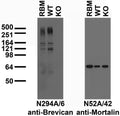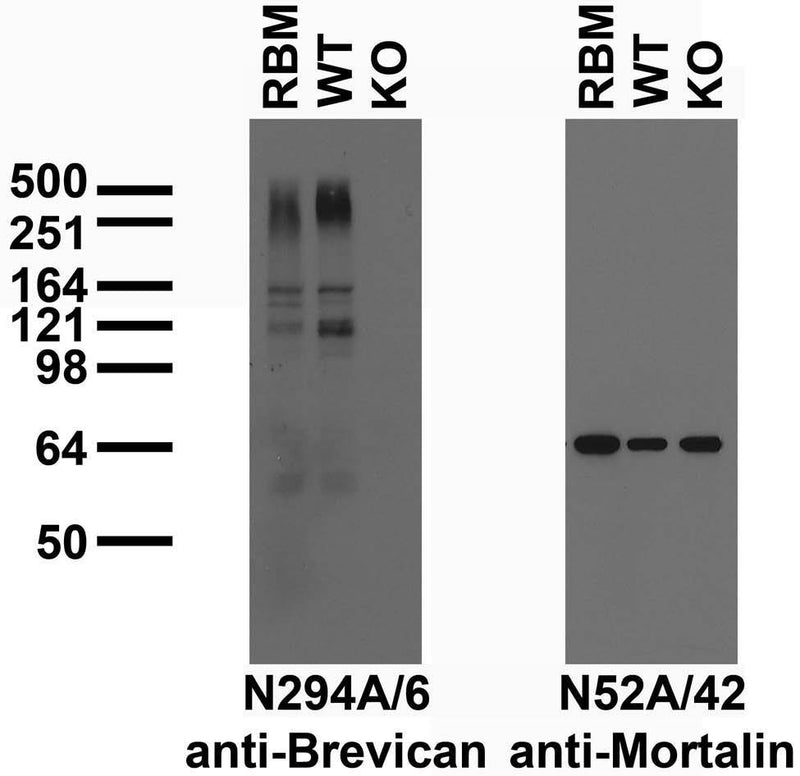Anti-Brevican Antibody (N294A/6)
Our Anti-Brevican mouse monoclonal primary antibody from NeuroMab is produced in-house from hybridoma clone N294A/6. It is KO validated, detects mouse and rat Brevican, and is purified by Protein A chromatography. It is great for use in IHC, ICC, WB.
Mouse, Rat
ELISA, ICC, IHC, WB
Mouse
SKU: 75-281
Ships: 1-2 business days
Product Details
Brevican
Brevican core protein, Chondroitin sulfate proteoglycan 7 or Brain-enriched hyaluronan-binding protein is encoded by the gene BCAN and is a member of the lectican family of chondroitin sulfate proteoglycans. Brevican is involved in the development and formation of the brain extracellular matrix and may be involved in malignancy of brain tumor cells. Brevican is developmentally regulated and specifically expressed in the central nervous system. Diseases associated with this gene include Low-Grade Astrocytoma.
Purified by Protein A chromatography
1 mg/mL
Monoclonal
N294A/6
IgG2b
ELISA, ICC, IHC, WB
Mouse
Bcan Behab
140 kDa (and smaller due to proteolytic cleavage)
Fusion protein amino acids 219-655 of rat Brevican (accession number P55068) produced recombinantly in E. Coli
Rat
Mouse, Rat
AB_2315822
Aliquot and store at ≤ -20°C for long term storage. For short term storage, store at 2-8°C. For maximum recovery of product, centrifuge the vial prior to removing the cap.
Liquid
Produced by in vitro bioreactor culture of hybridoma line followed by Protein A affinity chromatography. Purified mAbs are >90% specific antibody.
10 mM Tris, 50 mM Sodium Chloride, 0.065% Sodium Azide pH 7.125
Unconjugated
No cross-reactivity reported
Each new lot of antibody is quality control tested by western blot on rat whole brain lysate and confirmed to stain the expected molecular weight band.
These antibodies are to be used as research laboratory reagents and are not for use as diagnostic or therapeutic reagents in humans.
United States
24 months from date of receipt
Brevican core protein (Brain-enriched hyaluronan-binding protein) (BEHAB)
Shipped on ice packs
Product Specific References for Applications and Species
- Western Blot: Mouse
| Western Blot: Mouse | ||
| PMID | Dilution | Publication |
| 30254235 | 1:20 (supe) | Tajerian, M., et al. 2018. The hippocampal extracellular matrix regulates pain and memory after injury. Molecular psychiatry, 23(12), pp.2302-2313.. Molecular psychiatry, 2302-2313. |



